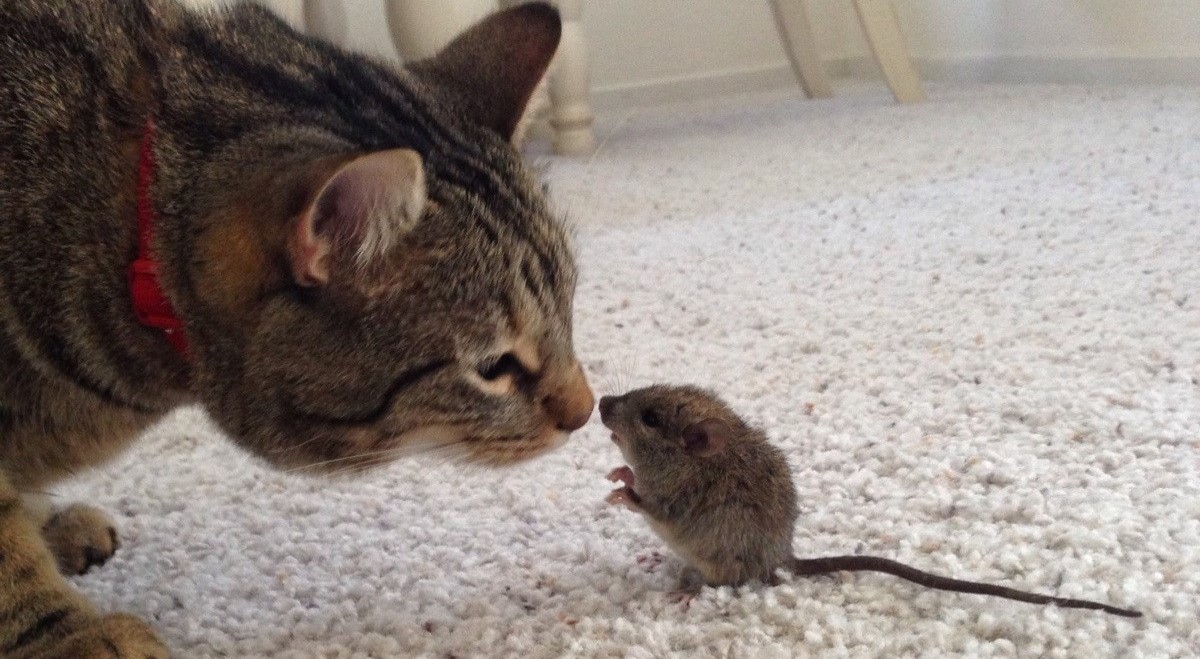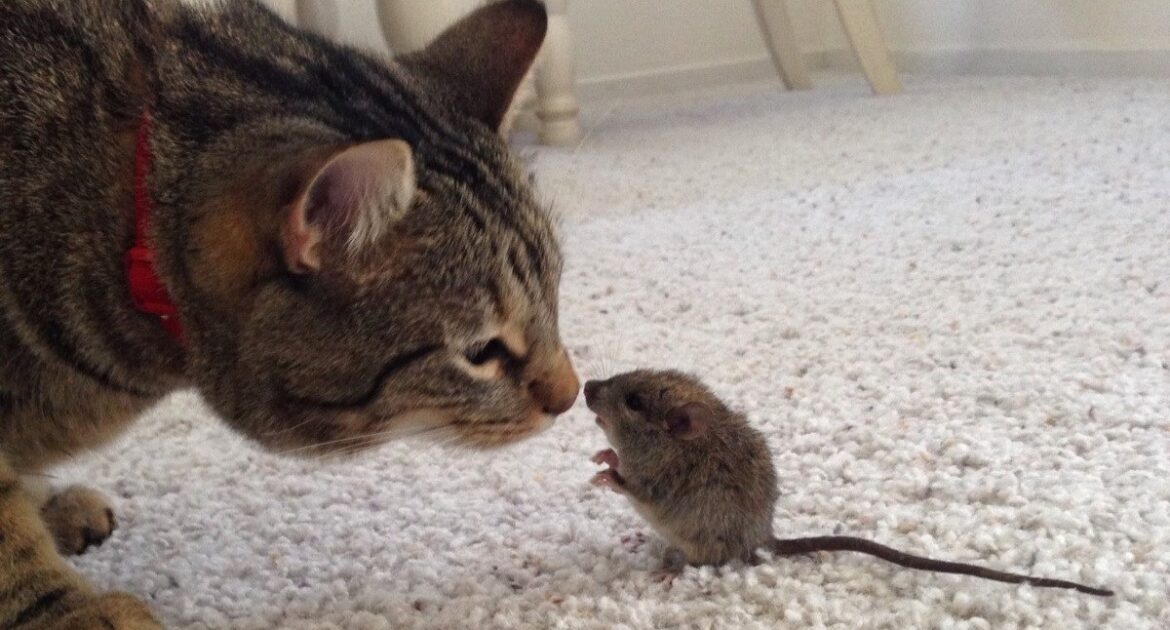Pets are often our first line of defence against unwanted visitors in our homes, especially when it comes to rodents. Many Whitby homeowners wonder about the effectiveness of their furry companions in preventing infestations. The relationship between pets and rodent control is complex and worth exploring if you’re looking for natural ways to keep mice at bay. Just like how Whitby Harbour stands as a protective gateway against Lake Ontario’s waters, your beloved pet might serve as a guardian against potential invaders.
At Skedaddle Humane Wildlife Control, we’ve seen firsthand how pets can play a role in deterring mice, but we also understand the limitations of relying solely on your four-legged friends. Let’s examine the real impact pets can have on mouse prevention and when professional intervention becomes necessary.
The Natural Deterrent Effect: How Pets Discourage Mice
When it comes to preventing mice with pets, their mere presence can make a difference. Mice are naturally cautious creatures with highly developed survival instincts.
The Scent Factor
Mice rely heavily on their sense of smell to navigate their environment and detect potential predators.
- Your pet’s scent alone can serve as a warning sign to mice, signalling danger and making your home less appealing as a potential habitat.
- The stronger the predator scent (particularly from cats), the more likely mice will avoid the area.
- Even homes with indoor pets may experience this benefit, as the scent can travel through ventilation systems and small openings.
Activity and Movement
The regular movement and activity of pets throughout your home create an unpredictable environment that mice prefer to avoid.
- Mice thrive in quiet, undisturbed spaces where they can move freely without detection.
- A dog or cat patrolling your home introduces an element of unpredictability that disrupts the security mice seek.
- Even smaller pets like ferrets can create enough disturbance to make mice think twice about settling in.
Real-world application: Allow your pets access to areas prone to mouse activity, such as basements, garages, and storage spaces. Their regular presence in these areas can help deter mice from establishing nests.
Which Pets Are Most Effective at Mouse Control?
Not all pets are created equal when it comes to deterring mice. Some possess instinctual hunting abilities that make them particularly effective in controlling rodent populations.
Cats: The Traditional Mousers
Cats have earned their reputation as natural mouse hunters for good reason:
- Hunting instinct: Most cats possess an innate drive to hunt small prey, regardless of whether they’re hungry.
- Physical capabilities: Their agility, speed, and stealth make them efficient predators.
- Sensory advantages: Cats can detect the high-frequency sounds that mice make and smell their presence even when hidden.
However, it’s important to note that not all cats are effective at controlling mice. Factors such as age, temperament, and early exposure to hunting can influence their abilities.
Breed considerations: Some cat breeds tend to be more active hunters than others. Maine Coons, American Shorthairs, and Domestic Shorthairs often demonstrate stronger hunting instincts compared to more sedentary breeds.
Dogs as Mouse Deterrents
While dogs may not have the same reputation as cats, certain breeds can be surprisingly effective at mouse control:
- Terriers were specifically bred to hunt rodents and often maintain this strong instinct.
- Working breeds with high prey drives, such as Jack Russell Terriers, Yorkshire Terriers, and Dachshunds, can be particularly vigilant about rodent activity.
- Even larger breeds can deter mice through their scent and movement, though they may be less adept at catching them.
Training opportunity: Dogs can be trained to alert you to mouse presence, even if they’re not active hunters themselves. This early warning system allows you to address potential infestations before they become established.
The Limitations of Pet-Based Mouse Control
While pets can help with deterring mice, relying solely on them for control comes with significant limitations. Understanding these constraints is crucial for effective pest management.
Inconsistent Results
The effectiveness of pets as mouse deterrents varies widely:
- Individual pet personalities play a major role—some cats and dogs show little to no interest in hunting.
- Older or less active pets may not provide consistent patrol coverage.
- Pet-accessible areas may see benefits, but inaccessible spaces remain vulnerable.
The Mathematical Reality
When considering pets and mouse control, we must acknowledge the reproductive capacity of rodents:
- A female mouse can produce 5-10 litters per year.
- Each litter typically contains 5-6 pups, though up to 12 is possible.
- Young mice reach sexual maturity in just 6 weeks.
Even the most dedicated hunting cat simply cannot keep pace with this exponential growth once an infestation begins. By the time you notice evidence of mice, you’re likely already facing a significant population.
Health and Safety Concerns
Relying on pets for mouse control can pose health risks:
- Contact with mice may expose your pet to parasites, diseases, and harmful bacteria.
- Mice can carry fleas, ticks, and mites that may transfer to your pet.
- If your pet consumes an infected mouse, they could contract illnesses or be exposed to rodenticides if the mouse has consumed poison elsewhere.
Important safety note: If you suspect mice in your home, monitor your pet closely for signs of illness after any hunting activity, and consult your veterinarian if concerns arise.
Optimizing Your Pet’s Role in Mouse Prevention
To maximize your pet’s effectiveness as part of your mouse prevention strategy, consider these approaches:
Creating a Pet-Friendly Mouse Prevention Plan
To leverage your pet’s natural abilities while protecting their health:
- Maintain regular feeding schedules for your pets to ensure they’re active and alert during prime mouse activity hours (typically dawn and dusk).
- Allow supervised access to areas where mice might enter, such as utility rooms, basements, and garages.
- Keep your pet healthy with regular veterinary check-ups to ensure they’re in optimal condition to serve as a deterrent.
- Monitor for signs of stress in your pet, as the presence of rodents can cause anxiety in some animals.
Working With Your Pet’s Natural Instincts
Different pets have different strengths when it comes to mouse control:
For cats:
- Provide perches near potential mouse entry points, allowing them to maintain watch.
- Keep play hunting skills sharp with interactive toys that mimic prey movement.
- Consider adopting cats in pairs, as this often increases their hunting motivation through friendly competition.
For dogs:
- Reinforce any natural alerting behaviours when they detect mouse activity.
- Take advantage of their keen sense of smell by allowing them to investigate areas where you suspect rodent activity.
- Praise them when they show interest in mouse scents to encourage continued vigilance.
When Professional Intervention Becomes Necessary
While pets can help deter mice, they’re rarely a complete solution. At Skedaddle Humane Wildlife Control in Whitby, we understand the signs that indicate it’s time for professional assistance.
Recognizing When Pets Aren’t Enough
Look for these indicators that your mouse problem requires professional intervention:
- Multiple mouse sightings despite pet presence.
- Droppings in pet-inaccessible areas like inside cabinets or behind appliances.
- Sounds of scratching within walls or ceilings.
- Nests discovered in storage areas.
- Damage to food packaging, insulation, or wiring.
The expert perspective: Even homes with multiple pets can develop significant mouse problems, particularly during colder months when outdoor food sources become scarce.
The Skedaddle Approach to Comprehensive Mouse Control
At Skedaddle Humane Wildlife Control, we take a holistic approach to mouse problems that complements your pet’s natural deterrent abilities. Our technicians perform thorough property assessments to identify all entry points—even those as small as a dime that mice use to access your home. We implement customized strategies that integrate your pet’s strengths with our expertise for effective control.
Relying solely on pets for mouse control poses limitations, as even the most dedicated hunters can’t outpace rodent reproduction. For a truly mouse-free home, turn to Skedaddle Humane Wildlife Control. Our experienced team will ensure your property is secure against intruders and provide a mouse-free environment for you and your pets. If you’re dealing with a mouse problem, don’t hesitate to reach out to Skedaddle for a professional and humane solution tailored to your needs.




